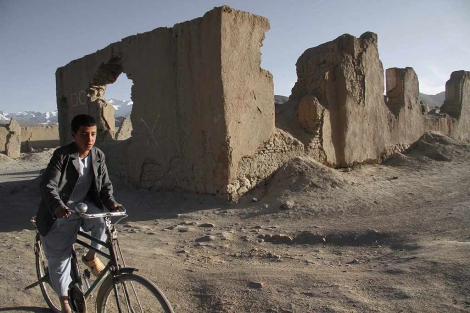The Pentagon says the NATO-led International Security Assistance Force (ISAF) and Afghan partners have been "tangible progress" against the Taliban over the past six months and the conditions on the ground can begin this summer, the partial withdrawal of troops. In the semi-annual report 'Progress toward Security and Stability in Afghanistan "that the Defense Department to Congress delivered on Friday, the top military commanders paint a rosy picture about the war in Afghanistan and the transition phase, perhaps the most optimistic in years , acknowledged today a senior official.
Speaking to reporters, recalled that the report of January 2009 the situation in Afghanistan is deteriorating and in October of that year the conditions have worsened, but in April 2010, after the troop surge, there were some progress and last fall were "signs of real progress." In the current analysis, the Pentagon calls the progress of "tangible", it says that the ISAF and Afghan allies have achieved important results in stopping the rebel push in much of the Central Asian country and even been reversed in several areas important.
The efforts of the coalition insurgents have taken over control of major terrorist sanctuaries, defeated the leadership of their networks and deleted caches of weapons and tactical supplies. Afghan security forces have more members, have improved their quality and capabilities, and have assumed an increasing role in security operations, according to the Pentagon's assessment.
Of course, progress in governance and development "have been slower than the gains in security," he says in the text. However, there has been "significant improvements, particularly in the south and southwest," he adds. The Defense Department also warns that "the progress throughout the country remains fragile and reversible." However, argues that "the thrust generated during the last six months has created the necessary conditions to begin this summer the transition of security responsibilities to Afghan forces in seven areas." U.S.
prepares to withdraw gradually from July to allow military units gradually, and based on conditions on the ground "in the hands of Afghan security forces in the country. The goal is to complete the transition in 2014. In the coming months there will be "setbacks" as is "success", concludes the Pentagon. 


Speaking to reporters, recalled that the report of January 2009 the situation in Afghanistan is deteriorating and in October of that year the conditions have worsened, but in April 2010, after the troop surge, there were some progress and last fall were "signs of real progress." In the current analysis, the Pentagon calls the progress of "tangible", it says that the ISAF and Afghan allies have achieved important results in stopping the rebel push in much of the Central Asian country and even been reversed in several areas important.
The efforts of the coalition insurgents have taken over control of major terrorist sanctuaries, defeated the leadership of their networks and deleted caches of weapons and tactical supplies. Afghan security forces have more members, have improved their quality and capabilities, and have assumed an increasing role in security operations, according to the Pentagon's assessment.
Of course, progress in governance and development "have been slower than the gains in security," he says in the text. However, there has been "significant improvements, particularly in the south and southwest," he adds. The Defense Department also warns that "the progress throughout the country remains fragile and reversible." However, argues that "the thrust generated during the last six months has created the necessary conditions to begin this summer the transition of security responsibilities to Afghan forces in seven areas." U.S.
prepares to withdraw gradually from July to allow military units gradually, and based on conditions on the ground "in the hands of Afghan security forces in the country. The goal is to complete the transition in 2014. In the coming months there will be "setbacks" as is "success", concludes the Pentagon.



No comments:
Post a Comment